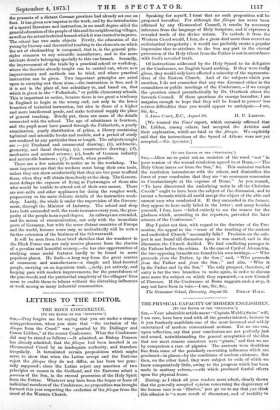THE PHYSICAL CAPACITY OF MODERN ENGLISHMEN.
[TO THE EDITOR OF THE"SPECTATOR."] SIR,—Your admirable article anent "Captain Webb's Swim" will, I am sure, have been read with all the greater interest, because in it you fearlessly annihilate one of the most favoured and widely entertained of modern conventional notions. Yet no one can, upon reflection, say that your conclusions are not perfectly just and sound, notwithstanding the general acceptation of the idea that our most remote ancestors were "giants," and that we are by comparison a race of pigmies. The ancients were doubtless free from some of the peculiarly enervating influences which are produced—in places—by the conditions of modern existence. But then, on the other hand, they were subject to evils of which we know comparatively little, owing to the progress which has been made in sanitary reform,—evils which produced fearful effects upon the physical frame.
Having, as I think all your readers must admit, clearly shown that the generally accepted opinion concerning the degeneracy of the human race is an "illusion," you go on to say that you think this allusion is "a mere result of discontent, and of inability to
see facts through the mist in which time kindly enshrouds them." No doubt this is true; and it is, I think, also true that not merely has this mist served to magnify remote facts until they have as- sumed unreal proportions, but the discontent to which you allude has from generation to generation been subject to an accumulating process which has helped still more to distort those facts.
To show bow completely English people have been subject to the illusion respecting their physical degeneracy, it may be men- tioned that Byron's feat in swimming across the Bosphorus has been almost universally regarded as a marvellous exploit. Yet I will venture to say that were this opinion put to a practical test, it would be found that there is in this country no swimming-club of any pretensions which could not furnish a man who would easily accomplish the same feat. Captain Webb's feat, it is true, stands alone, and is likely to stand alone for some time to come. Yet it would not, I think, be strictly correct to say that there is no other man equal to him in all the qualities necessary to accom- plish a like exploit. It is probable, however, that there are very few such men even in the British Islands,—and that is saying a good deal.
Genius has been very cleverly described as the accidental pos- session by the same individual of a number of ordinary qualities, and Captain Webb's success may perhaps be ascribed to the fact that he possesses a number of ordinary qualities—each un- questionably well developed—no one of which would, however, alone have enabled him to swim from Dover to Calais. But our swimmers do not know the extent of their capacities until they try them, and although it may take the most plucky and per- severing of them a very long time indeed even to approach the splendid exploit of this gallant seaman, it is certain that the effort to emulate his success will produce better swimming than this generation—Captain Webb, of course, excepted—has yet seen. Meanwhile, Sir, Englishmen will be indebted to you for telling them that they are not quite so degenerate as they thought them- selves.—I am, Sir, &c.,
Elm Dale, Paignton, August 30. FRANCIS GEORGE HEATH.































 Previous page
Previous page